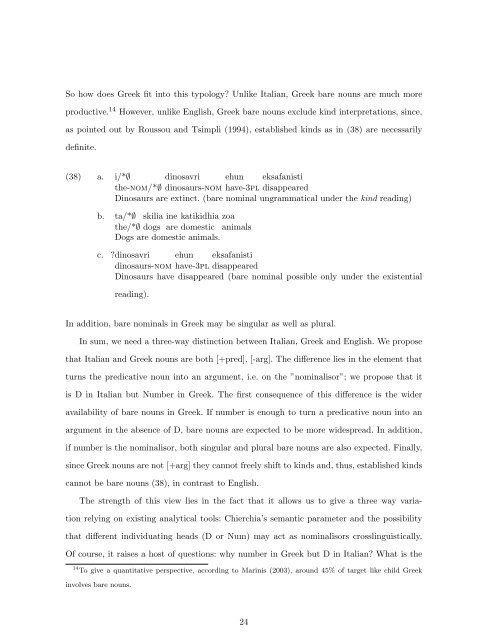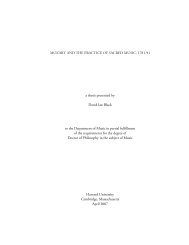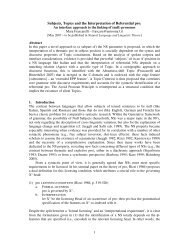draft of November 2011
draft of November 2011
draft of November 2011
You also want an ePaper? Increase the reach of your titles
YUMPU automatically turns print PDFs into web optimized ePapers that Google loves.
So how does Greek fit into this typology? Unlike Italian, Greek bare nouns are much more<br />
productive. 14 However, unlike English, Greek bare nouns exclude kind interpretations, since,<br />
as pointed out by Roussou and Tsimpli (1994), established kinds as in (38) are necessarily<br />
definite.<br />
(38) a. i/*∅ dinosavri ehun eksafanisti<br />
the-nom/*∅ dinosaurs-nom have-3pl disappeared<br />
Dinosaurs are extinct. (bare nominal ungrammatical under the kind reading)<br />
b. ta/*∅ skilia ine katikidhia zoa<br />
the/*∅ dogs are domestic animals<br />
Dogs are domestic animals.<br />
c. ?dinosavri ehun eksafanisti<br />
dinosaurs-nom have-3pl disappeared<br />
Dinosaurs have disappeared (bare nominal possible only under the existential<br />
reading).<br />
In addition, bare nominals in Greek may be singular as well as plural.<br />
In sum, we need a three-way distinction between Italian, Greek and English. We propose<br />
that Italian and Greek nouns are both [+pred], [-arg]. The difference lies in the element that<br />
turns the predicative noun into an argument, i.e. on the ”nominalisor”; we propose that it<br />
is D in Italian but Number in Greek. The first consequence <strong>of</strong> this difference is the wider<br />
availability <strong>of</strong> bare nouns in Greek. If number is enough to turn a predicative noun into an<br />
argument in the absence <strong>of</strong> D, bare nouns are expected to be more widespread. In addition,<br />
if number is the nominalisor, both singular and plural bare nouns are also expected. Finally,<br />
since Greek nouns are not [+arg] they cannot freely shift to kinds and, thus, established kinds<br />
cannot be bare nouns (38), in contrast to English.<br />
The strength <strong>of</strong> this view lies in the fact that it allows us to give a three way varia-<br />
tion relying on existing analytical tools: Chierchia’s semantic parameter and the possibility<br />
that different individuating heads (D or Num) may act as nominalisors crosslinguistically.<br />
Of course, it raises a host <strong>of</strong> questions: why number in Greek but D in Italian? What is the<br />
14 To give a quantitative perspective, according to Marinis (2003), around 45% <strong>of</strong> target like child Greek<br />
involves bare nouns.<br />
24
















